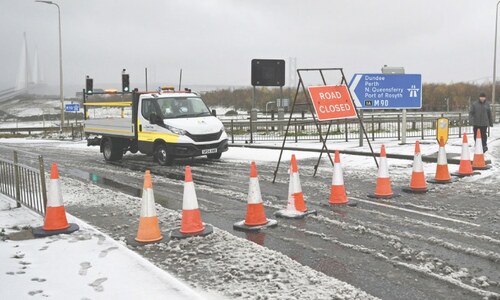MOSUL: Iraq’s prime minister declared victory over IS in Mosul on Monday, three years after the militants seized the city and made it the stronghold of a “caliphate” they said would take over the world.
“I announce from here the end and the failure and the collapse of the terrorist state of falsehood and terrorism which the terrorist Daesh announced from Mosul,” Haider al-Abadi said in a speech shown on state television.
Abadi, wearing a black military uniform and flanked by commanders from the security forces, thanked troops and the coalition. But he warned that more challenges lay ahead.
“We have another mission ahead of us, to create stability, to build and clear Daesh cells and that requires an intelligence and security effort, and the unity which enabled us to fight Daesh,” he said before raising an Iraqi flag.
Abadi arrived in Mosul on Sunday to congratulate military commanders who have waged a nearly nine-month battle to recapture the city, many parts of which were reduced to rubble.
Gunfire and explosions could be heard earlier in the day as the last few IS positions were pounded.
Abadi has been meeting military and political officials in Mosul in an atmosphere of celebration that contrasts with the fear that spread after a few hundred Islamic State militants seized the city and the Iraqi army crumbled in July 2014.
In the aftermath of victory in Mosul, Abadi’s government faces the task of managing the sectarian tensions there and elsewhere that enabled IS to win support, and the threat of a wave of revenge violence in the city.
Baghdadi has fled the city and his whereabouts are unknown. Reports have circulated that he is dead but Iraqi and Western officials say they cannot corroborate this.
His death or capture would not be the end of Islamic State, which still controls areas south and west of Mosul and which is now expected to take to the desert or mountains to wage an insurgency.
The militants are expected to keep trying to launch attacks on the West and inspiring violence by “lone wolves” or small groups of the kind mounted recently in Britain, France and elsewhere.
But the loss of Iraq’s second-largest city is a grave body blow to Islamic State.
“The recovery of Mosul is a significant step in the fight against terrorism and violent extremism,” said the spokesman for U.N. Secretary-General Antonio Guterres.
The stench of corpses along Mosul’s streets was a reminder of the gruelling urban warfare required to dislodge Islamic State.
Much of the city of 1.5 million has been destroyed in the fighting, its centuries-old stone buildings flattened by air strikes and other explosions.
Published in Dawn, July 11th, 2017













































